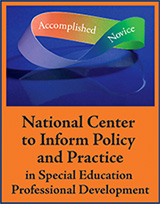What supports can school leaders provide to develop effective and committed special education teachers?
Page 2: What Is Induction?
 To address the challenges faced by new teachers, states and school districts are increasingly creating induction programs—comprehensive packages of supports to help new teachers transition into a school placement and become competent and effective professionals in the classroom. Components of induction programs might include:
To address the challenges faced by new teachers, states and school districts are increasingly creating induction programs—comprehensive packages of supports to help new teachers transition into a school placement and become competent and effective professionals in the classroom. Components of induction programs might include:
- Orientations to the district and school
- Introduction to the school community and culture
- Professional development
- Mentoring
Teacher induction might be provided for a year or two, or it might last as long as five years. Although often dependent on state or district policy or procedures, the length of induction can also depend on the needs of the individual teacher. Comprehensive, high-quality teacher induction can:
- Accelerate professional growth and teacher effectiveness
- Reduce teacher turnover
- Improve student learning
 Although there are clear benefits to effective induction, new special education teachers are less likely to receive supports than are their general education counterparts. Additionally, those special education teachers who do receive supports are less likely to view them as helpful. This might in part be because induction programs are often designed for all teachers and might not address the particular needs of special education teachers. For instance, they might benefit from district-level special education supports (e.g., meeting with an autism specialist), opportunities to meet with other new special educators in the district, and, in some situations, professional development that is geared toward particular areas of need (e.g., intensive behavioral interventions).
Although there are clear benefits to effective induction, new special education teachers are less likely to receive supports than are their general education counterparts. Additionally, those special education teachers who do receive supports are less likely to view them as helpful. This might in part be because induction programs are often designed for all teachers and might not address the particular needs of special education teachers. For instance, they might benefit from district-level special education supports (e.g., meeting with an autism specialist), opportunities to meet with other new special educators in the district, and, in some situations, professional development that is geared toward particular areas of need (e.g., intensive behavioral interventions).
There are a variety of ways to structure and implement induction. States, districts, and schools often have policies that address induction. School and district personnel need to work together to ensure that comprehensive induction supports are implemented. As district administrators and other school leaders plan teacher induction programs, they need to consider who will be responsible for planning, implementing, and evaluating the extent to which new special educators’ needs are met. Additionally, there might be opportunities to link with local teacher preparation programs to support new teachers as they transition to the classroom. Click here to review your state’s induction policy.
Research Shows
- First-year teachers who participated in a comprehensive set of induction activities were half as likely to leave the field as those who did not participate.
(Strong & Ingersoll, 2004) - New special education teachers who have strong induction support report that their roles are manageable, believe that they are successful in helping students with IEP goals, and indicate that they can help even the most difficult students.
(Billingsley, B., Griffin, C., Smith, S.J., Kamman, M., & Israel, M., 2009)
Listen as Margaret Kamman discusses the benefits of teacher induction (time: 1:20).
Margaret Kamman, PhD
Project Coordinator, CEEDAR and NCIPP
University of Florida

Transcript: Margaret Kamman, PhD
Teacher induction is the support we provide for new teachers coming into the classroom, and this support is typically between one year and five years. And teacher induction typically includes several types of support. It includes mentoring and professional development and coordinating with the site-based leadership. It’s a good idea because no matter what preparation new teachers come into the classroom with they don’t start day one as experts.
We know from the research that it takes years to develop expertise, and we also know that teacher learning does not stop when formal preparation ends and teachers take their first steps into the classroom. Like any field, teachers need to be lifelong learners, and new teachers are especially important to pay attention to because they’re just starting out their careers, and the context they start in will be new to them. And so they need help and assistance in navigating everything from policies and procedures to dealing with instruction and even navigating the environment of their colleagues.
Did You Know?
 The National Center to Inform Policy and Practice in Special Education Professional Development (NCIPP) focuses its work on the induction and mentoring of new special education teachers. NCIPP’s website contains a wealth of information, including Induction Insights, briefs written specifically for district administrators on topics relevant to induction for new special education teachers. Another helpful resource is a series of archived webinars. Finally, NCIPP created two manuals, a District Induction Manual and a Mentor Handbook, which provide comprehensive information about supporting new special educators. You can locate all these resources and more at http://ncipp.education.ufl.edu/
The National Center to Inform Policy and Practice in Special Education Professional Development (NCIPP) focuses its work on the induction and mentoring of new special education teachers. NCIPP’s website contains a wealth of information, including Induction Insights, briefs written specifically for district administrators on topics relevant to induction for new special education teachers. Another helpful resource is a series of archived webinars. Finally, NCIPP created two manuals, a District Induction Manual and a Mentor Handbook, which provide comprehensive information about supporting new special educators. You can locate all these resources and more at http://ncipp.education.ufl.edu/